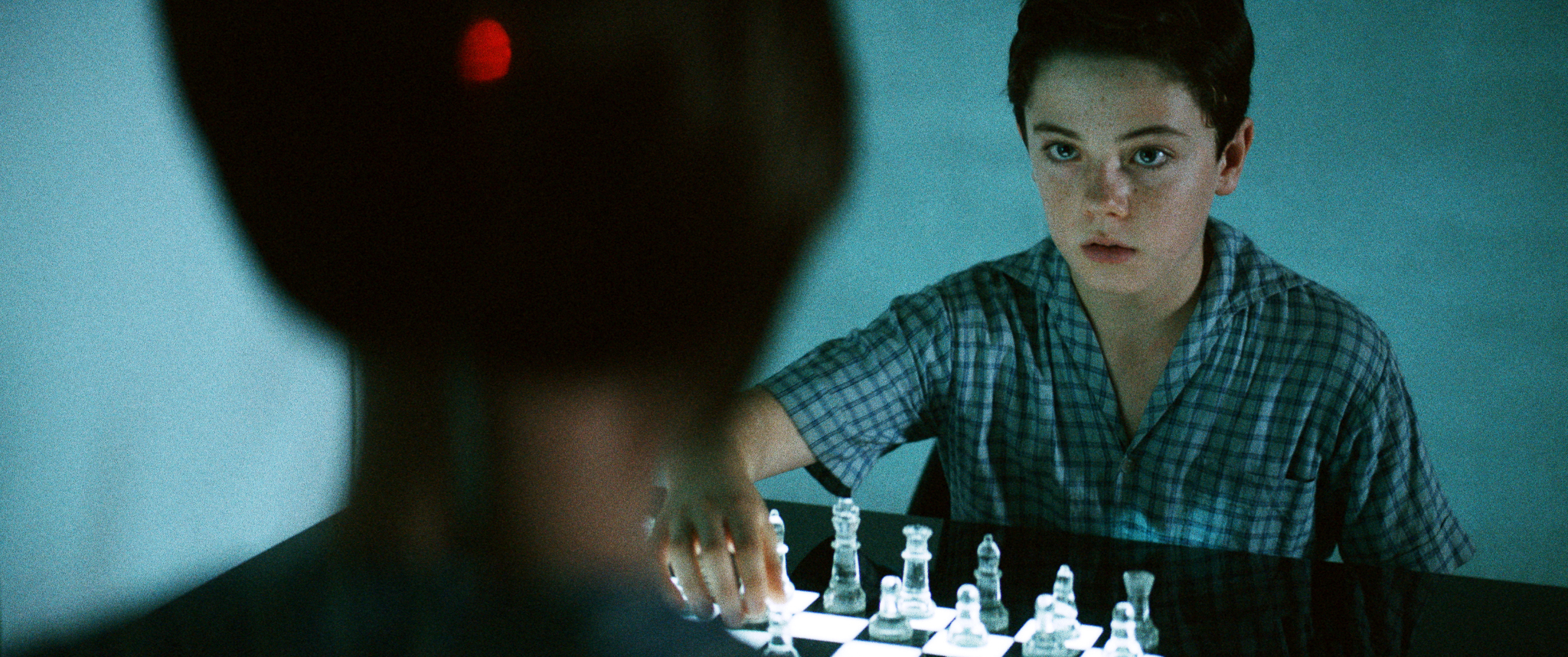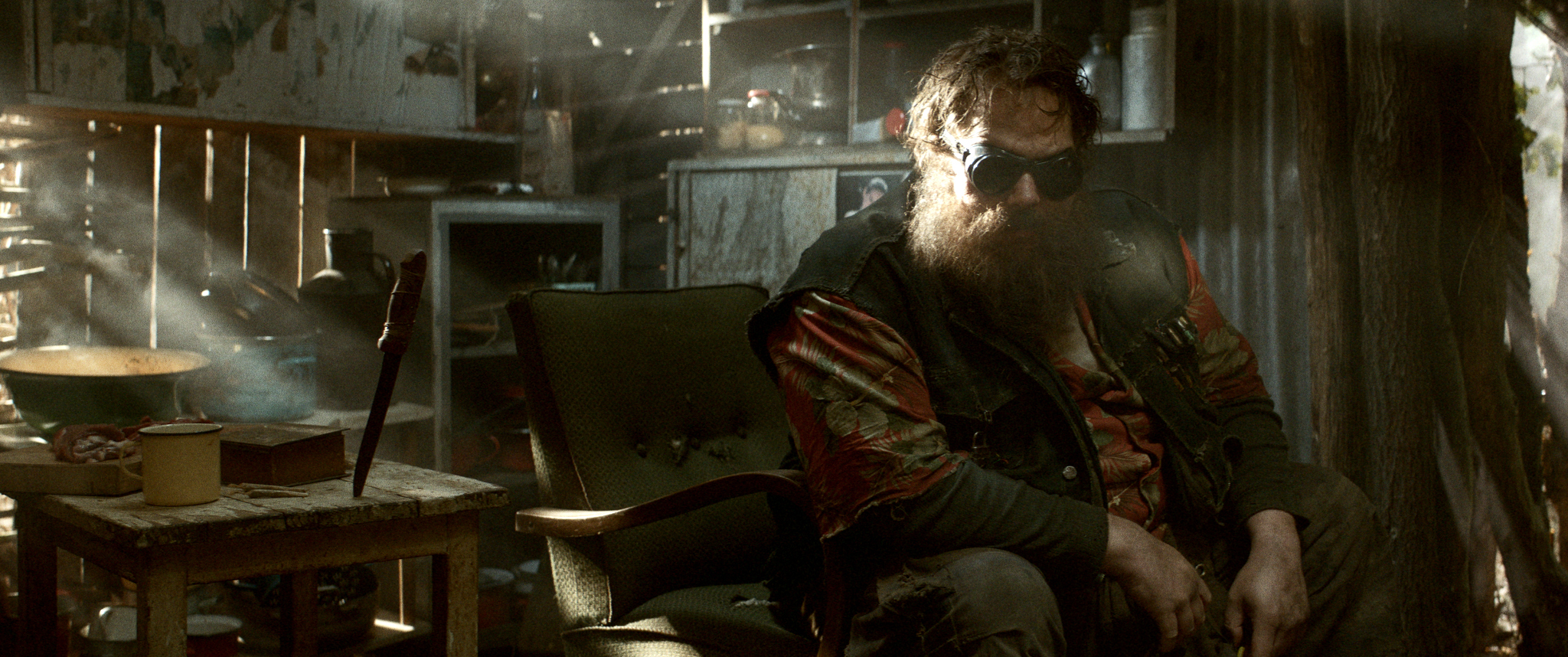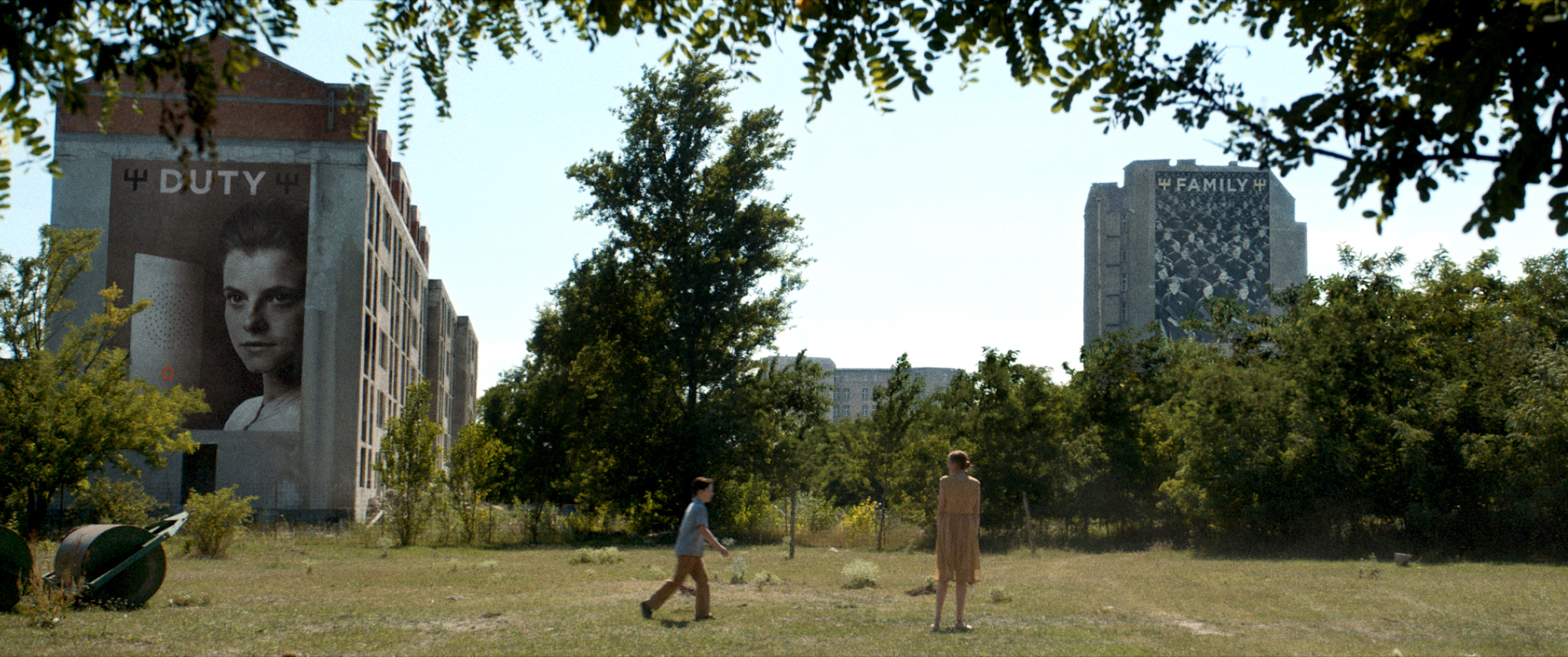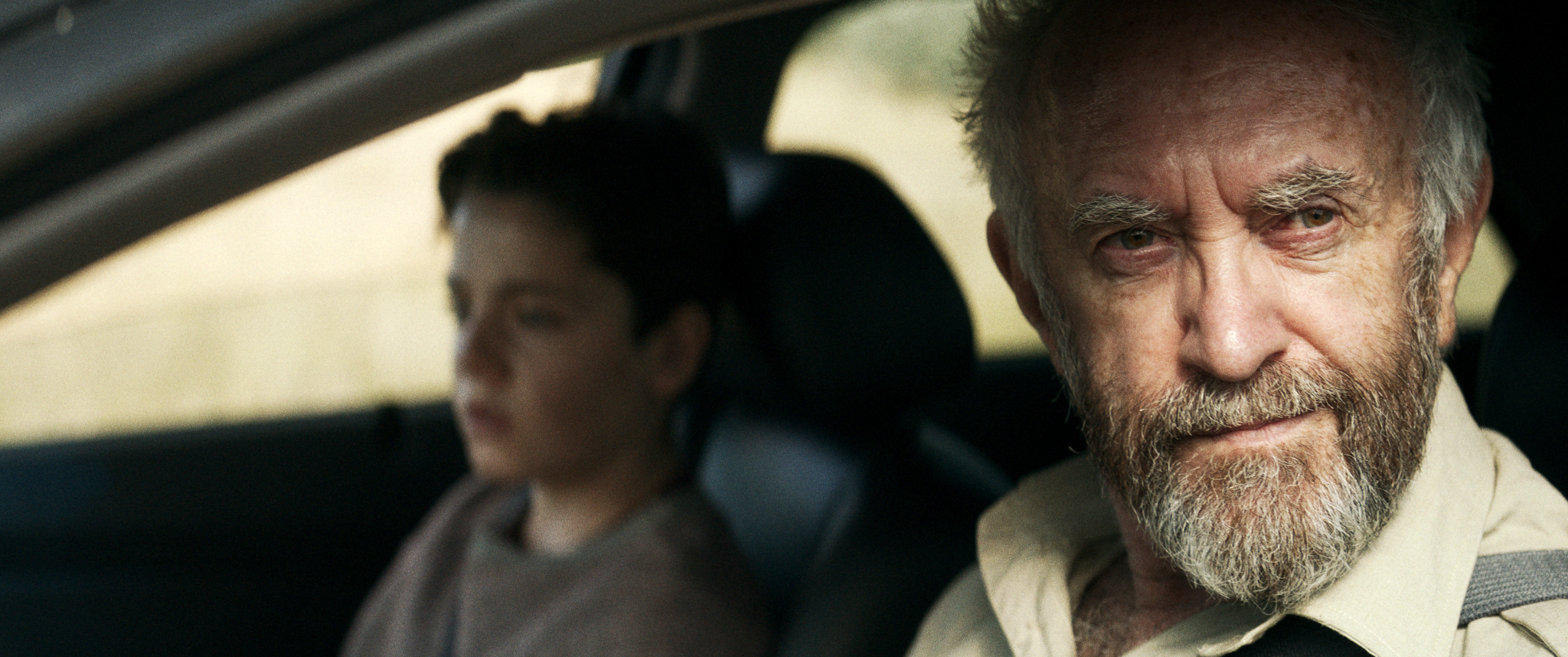Interview: Alex Helfrecht & Jörg Tittel Talk THE WHITE KING
Alex Helfrecht and Jörg Tittel's new film The White King, which made its European debut at Black Nights festival last week, is an all-too-familiar look at a dystopian future, about a boy living in a totalitarian regime. In my review, I called the film an impressive debut, a fascinating adaptation of how a child would view and attempt to understand forces and an environment beyond his control. I saw down with the writer-director team (also husband and wife) to talk more about the film, their inspriation, their vision, and how they work together.
The White King will be released in the UK in January 2017. You can find out more about the film on Facebook and Twitter.






Screen Anarchy: How did you discover the book?
Alex Helfrecht: It landed on my desk when I was working for some producers in London. It has been translated into more than 20 languages and has been critically acclaimed. I read it and fell in love with it; by page three I was crying. The boy was such a fascinating character, because he was part naive, and part intelligent. There was a surreal layer to the book which made me think there was something big about it. I thought it would be a great project for Jörg and I to combine our sensibilities, with an emotionally driven film, but also have a big canvas to work on. Something about it reminded me of Tom Sawyer, this adventure story but with this totalitarian world at the periphery. The regime is never really explained in the book; the author said it was inspired by his childhood in Romania, but he thought it could be anywhere in the world.
Jörg Tittel: To him, growing up in that place felt like when he watched A Clockwork Orange, this unreality, because it's so bizarre, that human behaviour could come to this. And so we though about how we would style this. The approach was then to augment the landscape, move it slightly into the future. We ended up shooting in Hungary, which brought the film back to its roots. But there are certain American elements in it. The cars are American.
Alex: And in the opening animation sequences, the water towers, which always feel very American to me. So the story really could be set anywhere.
SA: Most of the film is set in a rural community; there is little to indicate that it's the future except the few cars, and some communication technology. How did you set that up, to show this future world, with future technology, but the story set in the countryside?
Alex: The idea is that the revolution was a green dream that got taken over by the military, which then deprived the general populace. The military, those in power, have access to modern technology, architecture, transportation, but most people have had these false ideas thrust upon them and are living in squalor.
Jörg: This is what a lot of these repressive regimes do, they romanticize the purity of the rural life, going back to the land. They think is speaking to the poor, the farmers, we can get them to create our revolution, and then those people are abandoned.
Alex: We deliberately lensed it as well to make the scenes of nature beautiful, we didn't want to have the typical dark, sad dystopia look. You can have a beautiful landscape, but there is a huge statue hanging over it, eyes watching over you. It's the banality of the regime: in a shop, the weird speakerphone in your wall, the guy in a towel smoking a cigarette just coming out of the shower. A lot of the film is just about that everyday banality that you experience in this regime. In the parade scene, all the handmade signs praising the regime, and everyone participating, whether they want to or not. The power comes from that banality.
Jörg: Handcrafted hatred.
SA: The story is told from a 12-year-old's perspective. How did you have to adjust to get that perspective, in shooting and editing?
Alex: We wanted to be loyal to his perspective, so the challenge for that is partly in the storytelling. You are depriving the audience of some information, as you are discovering the world in real time with Djata. A child of that age doesn't notice the apparatus of the state, doesn't notice the cameras looking at him, doesn't even know why this regime has come into being, because he was born long after the revolution. So we had to treat all of that as peripheral. As an adult, you want to know more, but we have to do it from Djata's view.
Jörg: Some things just don't concern you when you're 12, and your age becomes a protection, a barrier. You're just starting to get a political mind, or it starts when something bad happens, as when Djata's father is taken away.
Alex: When Djata's father, very early in the film, is taken away by the authorities, Djata knows that something is wrong, he's not that naive. But he willfully wants to believe the lie that his father is just going to work, he's not ready to face the truth yet.
Jörg: Humans are good at compartmentalizing things, not seeing things if they don't want to, and kids especially. As kids we can dream and be naive. Lorenzo (Allchurch) is very smart, as smart as any of the adults, he was amazing on set. But he would still need a hug sometimes, and he would still need a bit of time to go off and play some football. Kids are very complex, they have the same complexities as adults, and we didn't want to condescend by dumbing it down and explaining too much, or showing everything from a low angle.
SA: Sometimes it does feel like an adventure film, when Djata and his friends confront the bullies, or when they try to find the alleged buried treasure.
Alex: It is a very emotionally-driven film, as all these things that happen to Djata are a test, testing him to find out what kind of adult he's going to become.
Jörg: The film is more driven by emotion that by plot. Every encounter leads back to Djata and his father being gone, and ultimately finding out what is worth fighting for. It was a bit of a dilemma, as I think there is a lot of expectation with this genre to be more plot driven, to give more specific details about the world of the film, so it was a challenge to focus on the emotional part of the story.
SA: You do 'explain' some of the back story in the opening title sequence, wonderful animation, that gives an idea of what happened, what the revolution was.
Jörg: We showed an early cut to some of our more literal-minded friends, and a lot of them just didn't understand where it was set. Even though we wanted to keep it in Djata's perspective, we did have to explain a little bit, in order to reach our audience. So we thought of this, an animated sequence that tells the story through the language of propaganda, the symbols that will be seen through the film. I approached an animation studio, Spov, they do a lot of video games like Call of Duty and Titan Fall. They don't typically do 2-D animation, but we brought them the script, and they came up with it.
Alex: It was helpful to give some back story.
Jörg: I'm a big fan of the movie Gattaca, which also sets up its world very simply, and it's a sci fi film, but it's ultimately about learning to live with your imperfections. It just happens to be set in the future. I love genre films that don't necessarily cater to the 'rules' of that genre.
SA: How did you find working together, as co-screenwriters, co-directors, and husband and wife?
Alex: We divide up a lot of the work. With the schedule, it was easier to divide the work up, so I was working with actors, and Jörg focused on the visuals. But we would both be behind the monitor, we would have our private dialogues, and figure out what worked best.
Jörg: We maximized our schedule; the days off, we had to look after our children. Directing this together, we did share the guilt over not being as present with our children. We usually work from home, and are around our kids constantly; so suddenly working 16 hour days was tough.
Alex: You cannot help but take discussion of work home. But we're working with an organization called Raising Films, which advocates for parents working in the film industry. We're helping to set up a fund, with grants for parents working in film, to help with childcare, so people don't miss out on a work opportunities.

More about The White King
Around the Internet
Recent Posts
Friday One Sheet: LIVING THE LAND
Now Playing: BLADES OF THE GUARDIANS and Some Other Movies
Leading Voices in Global Cinema
- Peter Martin, Dallas, Texas
- Managing Editor
- Andrew Mack, Toronto, Canada
- Editor, News
- Ard Vijn, Rotterdam, The Netherlands
- Editor, Europe
- Benjamin Umstead, Los Angeles, California
- Editor, U.S.
- J Hurtado, Dallas, Texas
- Editor, U.S.
- James Marsh, Hong Kong, China
- Editor, Asia
- Michele "Izzy" Galgana, New England
- Editor, U.S.
- Ryland Aldrich, Los Angeles, California
- Editor, Festivals
- Shelagh Rowan-Legg
- Editor, Canada












